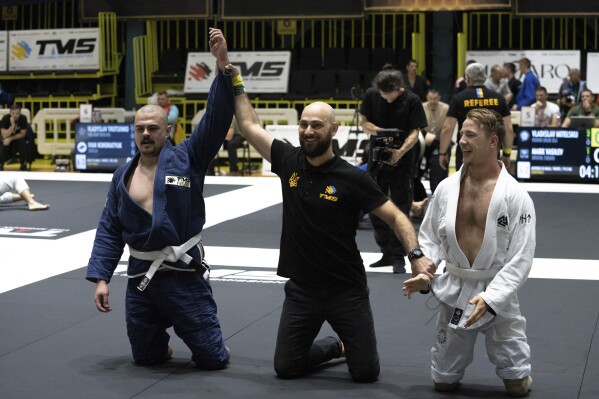[ad_1]
LONDON (AP) — British D-Day veteran Bill Gladden turned 100 on Saturday, a day after his niece threw him a surprise birthday party. It was a big fuss that he hadn’t really expected, although the old soldier had already had tears in his eyes when he saw the cake decorated with replicas of his uniform and the medals he had earned.
But Gladden’s focus isn’t on his birthday this year, it’s that big. He has been waiting for six months.
That’s because the event he really wants to attend is the 80th anniversary of the D-Day landings on June 6. This may have been the last of the large events marking the beginning of the end of World War II in Europe as very few of the 850,000 participating soldiers survived. Gladden wants to be there to honor those who are gone — to remind people that victory doesn’t come cheap.
“If I could do that this year, I should be happy,” he told The Associated Press from his home in Haverhill, eastern England, where he still lives alone. “Okay, I’m happy now, but I should be happier.”
A dispatch rider with the 6th Airborne Reconnaissance Regiment, Gladden landed behind the front lines in a wooden glider loaded with six motorcycles and 17,000 pounds (7,700 kg) of tanks on D-Day, June 6, 1944. The unit was part of an operation to secure bridges over the River Orne and the Caen Canal, so that they could be used by Allied forces moving inland from the Normandy beaches.
Based in a garden outside the village of Ranville, Gladden spent 12 days in the surrounding countryside investigating reports of enemy activity.
On June 16, he took two wounded soldiers to a barn that was being used as a temporary field hospital. Two days later, he found himself in the same barn, his right ankle shattered by machine gun fire.
Lying on the grass outside the hospital, he read the treatment label on his tunic:
“Amputation was considered. Big deep wound in right ankle. Compound fracture of both tibia and fibula. All extension tendons were destroyed. To evacuate.”
Gladden did not lose his leg, but he spent the next three years in the hospital as doctors performed multiple surgeries, including tendon transplants, skin and bone grafts.
After the war, Gladden married Army driver Marine Warne, whom he met in 1943 and spent 40 years working for Siemens and Pearl Insurance. He had a daughter.
These days he is more likely to talk about how proud he is of his family than to reminisce about D-Day. But his wartime story is preserved in a scrapbook that includes a newspaper clipping about “tanks that were built to fly”, his portrait and other memorabilia.
There is also a piece of parachute left by one of the paratroopers who landed in Ranville’s garden. While he was recovering from his wounds in the hospital, Gladden painstakingly sewed his unit’s shoulder insignia into fabric.
After eight decades the edges are frayed and discolored, but “Royal Armored Corps” still stands out in an arc of red letters on a yellow background. Below is a silhouette of the flying horse Pegasus above the word “Airborne”.
“These are the peep-toes we wore over our battledress blouses,” the caption read in neat capital letters.
Nothing has faded from memory, however. At his party, people celebrated his service and wished him a happy birthday.
“I just think he’s a legend, what he’s been through, what he’s seen, what he’s done,” said his niece Kaye Thorpe. “She’s absolutely amazing, and she’s still bright as a button at the top.”
However, for men like Bill Gladden, there was no I at D-Day. Even when he celebrated his 100th birthday, somehow it wasn’t just about him. Instead, he echoed the words of many survivors of the invasion.
“When you think about all those young lives that lay in those cemeteries overseas, the Allies and we won the war, but (the victory) was very costly in terms of lives,” he said. Because a lot of young people died.”
,
Associated Press writers Mayuko Ono and Alastair Grant contributed
[ad_2]
Source link
